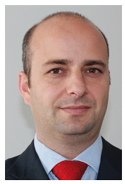Partner involvement is important
Huawei Technologies España’s Alejandro Fernández López wants law firms’ senior lawyers handling the company’s legal matters because ‘direct contact’ with decision-makers is important
Law firms that want to charge hourly rates can give up any hopes they have of winning business from telecoms company Huawei Technologies España, according to the organisation’s Madrid-based Iberia Legal Director, Alejandro Fernández López. “I really do not like hourly rates and the moment a law firm starts to talk about charging hourly rates I say ‘just forget it’ as I prefer to work a different way,” he says. Fernández López adds that he much prefers his external advisers to work on a fixed-fee or a capped basis because he “likes to know what is going to be the final price”.
How does Huawei Technologies España decide which law firms to use? Fernández López tends to select his external advisers on an ad hoc basis and although he does have firms he prefers to work with, he declines to name them. “I try to analyse each case individually and choose the best law firm within that area of expertise rather than have one firm doing all the work,” he explains. “In addition, I like to see the active involvement of partners or senior lawyers in the matters rather than having to deal with junior lawyers or paralegals all the time,” Fernández López adds. “It is important to have direct contact with the decision makers.”
Local law firms preferred in Spain
To this end, Fernández López says that while Huawei – like many other big corporations – likes to work with “the big firms” on a global basis, in Spain the approach is different. “I prefer the mid-sized, local law firms,” he explains. “I tend to find that they have much more local knowledge.”
Fernández López outsources all of Huawei’s local litigation work, some labour matters and certain tax-related mandates, but a large proportion of the legal work remains in-house. The five-strong in-house legal team does all the company’s contracts, including drafting and reviewing, as well as certain negotiations. They also act as an adviser to other departments and business units in Huawei, including in relation to documents such as non-disclosure agreements and memorandums of understanding as well as corporate issues, reports and compliance.
Huawei is one of the biggest telecommunications equipment manufacturers in the world, covering telecom carrier networks and devices. This highly competitive market means the company is vying with giants such as Apple and Samsung for a share of the devices market with its Ascend smartphone range. As such, it is little surprise that Fernández López cites the challenges of staying at the cutting-edge of technology as critical.
Regulation moving up the agenda
“Technology is moving very fast so, as a business, you have to tackle the various business models and competitors to keep on top of the market,” he states. In this respect, Huawei’s Spanish division does not handle IP matters directly – this work is done centrally from either the European base in Germany or the main headquarters in China – but Fernández says that IP is an important matter for the division – alongside issues such as data protection – because of the significant impact it has on legal compliance, for example. “Regulation is becoming a much more pressing matter,” Fernández López states. Accordingly, he cites the recent reforms to the Spanish Criminal Code and their impact on compliance systems.
The pressure on companies to improve their compliance programmes is mounting. Since 1 July, 2015, company directors are duty bound to follow a compliance regime, which in turn must be managed by a specific entity or individual within the company. Consequently, there is the real danger that both directors and the company can be held criminally liable for wrongdoing within that organisation. “The new Spanish system has been in place less than a year but it means that every company in the country has to establish and follow a very strict compliance programme,” Fernández López states. “This is creating a lot of work and questions for legal departments as companies are looking to ensure compliance in everything from anti-bribery provisions to data protection to anti-money laundering to internal reporting.”
The fear of being held criminally liable for non-compliance ensures that compliance programmes are at the top of companies’ agendas. Fernández says that, while ensuring companies are compliant is a major task, it is a priority for many businesses because “directors, managers and the company itself do not want to find themselves in court facing criminal charges”.
Alejandro Fernández López is Iberia Legal Director at Huawei Technologies España











